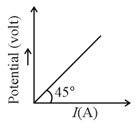Ohm's Law
Ohm's Law: Overview
This topic covers concepts, such as, Temperature Effect on Resistivity, Resistivity versus Temperature for Conductor, Variation of Drift Velocity in Non-uniform Cross-section Wire & Variation of Electric Field in Non-uniform Cross-section Wire etc.
Important Questions on Ohm's Law
A wire of resistance is gradually stretched to double its original length. It is then cut into two equal parts. These parts are then connected in parallel across a battery. Find the current drawn from the battery.
A physical quantity, associated with electrical conductivity, has the SI unit ohm-meter. Identify this physical quantity.
Two conducting wires X and Y of same diameter but different materials are joined in series across a battery. If the number density of electrons in X is twice that in Y, find the ratio of drift velocity of electrons in the two wires would be:
The conductivity of a material varies with temperature for (i) semiconductors and (ii) good conductors as
Derive an expression for the resistivity of a good conductor, in terms of the relaxation time of electrons.
Two metallic wires of the same material have the same length but cross-sectional area is in the ratio . They are connected (i) in series and (ii) in parallel. Compare the drift velocities of electrons in the two wires in both the cases (i) and (ii).
The number density of free electrons in a copper conductor is How long does an electron take drift from one end of a wire 3.0 m long to its other end? The area of cross-section of the wire is and is carrying a current of 3.0 A.
A voltage of is applied across a carbon resistor with first, second and third rings of blue, black and yellow colours respectively. Calculate the value of current, in , through the resistor.
The number density of free electrons in a copper conductor is estimated at How long does an electron take to drift from one end of a wire 3.0 m long to its other end? The area of cross-section of the wire is and it is carrying a current of 3.0 A.
The relation between current and drift velocity is
A long wire is broken into two unequal parts and . The part of the wire is stretched into another wire . Length of is twice the length of and the resistance of is twice that of . Find the ratio of length of and.
Given below are two statements: one is labelled as Assertion A and the other is labelled as Reason R.
Assertion A: Alloys such as constantan and manganin are used in making standard resistance coils.
Reason R: Constantan and manganin have very small value of temperature coefficient of resistance.
In the light of the above statements, choose the correct answer from the options given below.
A wire of resistance is drawn out so that its length is increased by twice of its original length. The ratio of new resistance to original resistance is:
A. The drift velocity of electrons decreases with the increase in the temperature of conductor.
B. The drift velocity is inversely proportional to the area of cross-section of given conductor.
C. The drift velocity does not depend on the applied potential difference to the conductor.
D. The drift velocity of electron is inversely proportional to the length of the conductor.
E. The drift velocity increases with the increase in the temperature of conductor.
Choose the correct answer from the options given below:
Eight copper wire of length and diameter d are joined in parallel to form a single composite conductor of resistance . If a single copper wire of length have the same resistance then its diameter will be _____ .
The variation of applied potential and current flowing through a given wire is shown in figure. The length of wire is . The diameter of wire is measured as . The resistivity of the given wire is measured as . The value of is _____ .
[Take ]

Resistance of the wire is measured as and at and respectively. Temperature coefficient of resistance of the material of the wire is
The length of a given cylindrical wire is increased to double of its original length. The percentage increase in the resistance of the wire will be _____
An aluminium wire is stretched to make its length, larger. The percentage change in resistance is
A part of a circuit is shown in figure. Here reading of ammeter is ampere and voltmeter is & voltmeter resistance is ohms. Then find the resistance in ohm

